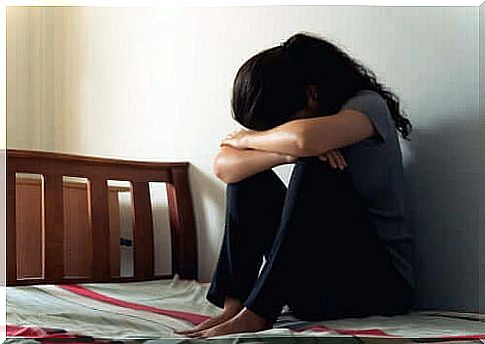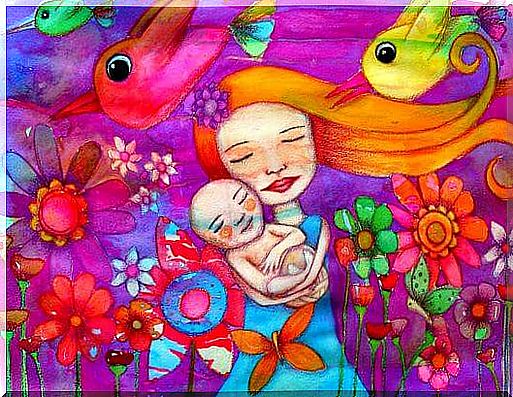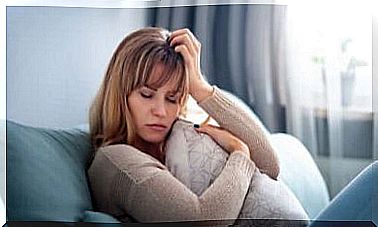Description And Treatment Of Perinatal Psychosis

Certainly, becoming a mother is one of the most life-changing events of a woman. And this, at all levels. Whether it’s hormonal, physiological, cognitive or social, women who have given birth must adapt on many levels. This is essential if they want to maintain physical and mental balance. However, this adaptation can be compromised when disorders such as perinatal psychosis appear.
A long ignored disorder
For years, medicine and science in general have viewed motherhood as an overall positive factor for women’s mental health. For this reason, when psychopathological symptoms appeared in pregnant women or mothers of young children, they often tended to be minimized. They were then seen as an integral part of the motherhood process and it was believed that these mothers would recover on their own.
The prevalence of perinatal mental disorders is quite high. This concerns about 25% of mothers. Nevertheless, there are still women who are not diagnosed as such. Often they are prescribed antidepressants and they are not listened to or understood.
Although rarely taken into account, the relationship between the perinatal period and mood disorders, especially psychosis, has already been described in the time of Hippocrates (700 BC). However, it was not until the 18th and 19th centuries that German and French medical literature presented the first systematic case studies of postpartum psychosis.
It was Füstner in 1875 who finally gave it a name. Perinatal psychosis then refers to one of the most serious forms of psychiatric disorders occurring in the period immediately after birth.

What are the symptoms of perinatal psychosis?
Perinatal psychosis is characterized by psychotic emotional episodes, mainly manic, but also depressive or mixed. Symptoms usually appear between a few days after childbirth and up to 2 weeks after childbirth. Manic manifestations are associated with an important flow of speech, leaks of ideas, an excessive increase in social activities or even euphoria.
Prenatal psychosis is therefore generally characterized by an emotional episode of an acute psychotic nature at the onset that occurs in the hours or days following childbirth. It does not necessarily start with emotional or psychotic episodes, however. The warning symptoms are few, which makes prevention even more difficult.
The patient experiences phases of elation and then depression. She has strong mood swings and appears confused and puzzled. A bit like an organic psychosis. In addition, there is also a lack of awareness of the phenomenon on the part of the mother. Sometimes the patient even seems to forget that she was pregnant and has given birth.
It is important to keep in mind that the period of greatest risk for symptoms to appear is during the first 3 weeks after childbirth. However, the first symptoms usually appear in the first hours after childbirth and up to three days later. The duration of the episode is short. It is always marked by a return to the previous state, and therefore a complete remission of symptoms.
Why does perinatal psychosis occur?
Perinatal psychosis is associated with brain changes that occur in a mother when her child is born. Certain risk factors seem to predispose some women more than others to psychosis. These include women with a psychiatric history and women who are delivering their first child.
Women who have experienced obstetric complications such as infections or preeclampsia also suffer from perinatal psychosis more often. As well as those prone to lack of sleep or having a family history of bipolar disorder.
On the other hand, Jones and Craddock demonstrated in 2001 that perinatal psychosis clearly has a genetic component. There is also a family association, particularly linked to bipolar disorder. However, no specific gene for perinatal psychosis has yet been identified.
This decrease in dopamine would then imply hypersensitivity of dopaminergic D2 receptors. This would result in an increase in dopamine after childbirth. This increase in dopamine in the brain would then be responsible for the psychotic symptoms. It is for this reason that research is being carried out to see if estrogen prophylaxis after childbirth could help in the prevention of these psychotic episodes.
Another line of thought concerns the immune system. Indeed, during pregnancy, the woman’s immunity is temporarily put on standby in order to facilitate the histocompatibility of the fetus.
However, after childbirth there would be a rebound effect of immunity. This would promote the development of autoimmune diseases.

Is there a treatment for this type of psychosis?
Currently, treatment consists of hospitalizing the baby and the mother. This is indeed the best way to prevent much more tragic consequences such as suicide or infanticide. However, during hospitalization, caregivers are careful to encourage the bond between mother and baby. For this, they try to avoid separations as much as possible.
From a pharmacological point of view, perinatal psychosis is managed mainly from mood stabilizers and high doses of neuroleptics. Sometimes electroconvulsive therapy may be necessary. Even if this treatment is not contraindicated for the fetus, note that if it is administered before childbirth, it is advisable to analyze the cost / benefit ratio during the last trimester of pregnancy or during the period following childbirth.
Finally, there is a last therapy that is effective. It is a video-feedback therapy. The objective of this technique is that mothers suffering from emotional or psychotic disorders thus increase their sensitivity towards their baby. This thus promotes cooperative behavior between mother and child. Indeed, the faster the woman appropriates her role of mother, the faster she will recover psychologically.









